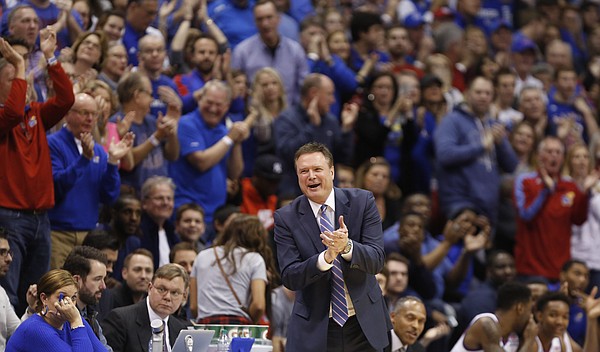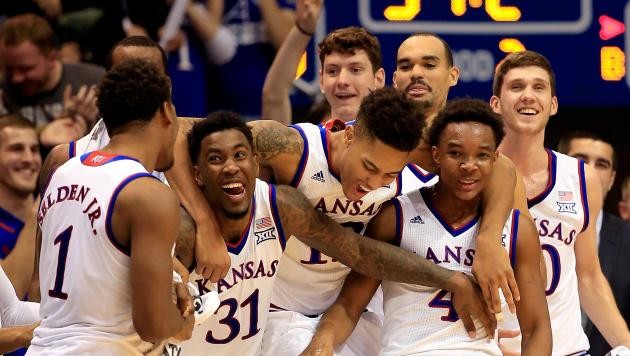Tuesday night, the Kansas Jayhawks won the outright Big 12 championship most people thought they’d win all along, present company very much included.
Death. Taxes. Bill Self winning the Big 12. It’s part of the air we breathe in college basketball, as regular as your morning coffee or six timeouts in the final two minutes of regulation.
Yet, what seems commonplace and expected on the surface can still be remarkably riveting and historically overpowering underneath. When you peel away the layers of Kansas basketball, you uncover some statistics that are as amazing as KU’s comeback against the shorthanded but never outworked West Virginia Mountaineers.
HOW IN THE NAME OF ADONIS JORDAN DID KANSAS WIN THAT GAME LAST NIGHT?!?!?!?
The Jayhawks trailed by as many as 18 points to a West Virginia team missing two of its best players — and which suffered injuries to another — during the course of the contest in Phog Allen Fieldhouse:
Juwan Staten and Gary Browne not playing tonight. Devin Williams hurt. Jevon Carter scoreless. #WVU up 40-26 on the #9 team in the country
— Chris Anderson (@CMAnderson247) March 4, 2015
West Virginia, the team that never gets out-hustled, continued to beat Kansas to loose balls, especially at the offensive end of the floor. The Mountaineers had a 14-2 advantage in offensive rebounds at one point and kept tracking them down as the second half careened toward its conclusion. Whenever Kansas made a move, West Virginia regularly got an offensive rebound or popped in a three-pointer to stem the tide. Kansas unleashed 9-0 and 5-0 runs during the second half, making you think that the inevitable comeback was on its way, but the Mountaineers halted each of those runs. With under two minutes left, West Virginia still led by eight, and even the most optimistic Kansas fan — who has seen the Jayhawks pull so many improbable wins out of the fire in The Phog — had to confront the realistic prospect of defeat.
After all, Kansas hit as many threes in this game as the number of Final Four appearances made by archrival Missouri… which is to say, NONE. Brannen Greene, the purest shooter the Jayhawks have on their roster, has not been making threes of late, and when Kansas doesn’t get production from the people asked to be knockdown shooters on its roster, well, we know what happens in March, right? Greene went 0-for-5 from three-point range on Tuesday, so the Jayhawks must have lost, of course.
NOT SO FAST, MY FRIEND!
The author of this piece takes credit as being the originator of a very special college basketball hashtag, one you’re welcome to use through the Final Four. Why do we observe National #FreeThrowAwarenessMonth in America? We do so because, as the great Bill Raftery said during a 2002 UCLA-Cincinnati NCAA tournament broadcast on CBS, “Free throws can destroy a family.” They also enable teams to make late, great comebacks.
*
West Virginia attempted five foul shots in the final 41 seconds of regulation… remember, against a team that could not and did not hit a single three-pointer. The Mountaineers hit only 2 of 5 foul shots, and since one miss was a front end of a one-and-one, WVU essentially hit 2 of 6 free throws in that time span. Given that a pair of turnovers led to four quick Kansas points in the minute preceding the final 41 seconds of regulation, the Jayhawks — without making a three — were able to stitch together enough exchanges of possessions to come all the way back and force overtime. It’s worth noting that with KU down by two and only 52 seconds left, Jayhawk coach Bill Self chose to foul and extend the game, instead of playing defense and enabling WVU to run 35 seconds off the clock. Self did what Georgia coach Mark Fox and others often fail to do.
That’s why Bill Self is who he is: a damn good coach, one of the very best in the sport.
Self dared West Virginia to make extra foul shots in the final 41 seconds, instead of limiting himself to the narrow framework of “one stop and one score,” an outmoded way of thinking more coaches need to jettison. Self’s position was clearly the enlightened one: West Virginia hit only 16 of 28 foul shots for the game. Kansas created overtime, and in that overtime, the Jayhawks predictably prevailed, locking up an outright Big 12 title and owning at least a piece of the Big 12 title for the 11th straight season. The last time KU didn’t even share the Big 12? 2004, when Eddie Sutton’s Oklahoma State team lifted the trophy.
*

Bill Self’s body of work in the Big 12 is second to none. You can reasonably claim that the Big 12 stumbled this season — Iowa State and Oklahoma tossed in some perplexing losses — but that doesn’t change or diminish what Self has done at Kansas. A run of 11 straight regular-season championships in a contentious power conference is amazing beyond belief… and will always remain that way.
It’s really rather remarkable to comprehend what Bill Self has done at Kansas, especially within the context of Big 12 competition.
With the win last night over West Virginia, Self’s KU teams have STILL never been swept in a single conference regular season — not by anyone, ever. Not even in 2004, Self’s first and least convincing season on the job.
With last night’s win, Kansas moved to 190-9 in The Phog under Self. You can do the quick math and realize that Self’s conference championships (11) outnumber the amount of times he’s lost at home in 12 full regular seasons. Come on — that is RIDICULOUS.
Perhaps the most mind-blowing stat of all, though, is this:
Kansas 14-0 since 2006 when they make 1 or 0 threes
— RCT (@rockchalktalk) March 4, 2015
Clearly, the secret is for Kansas to make two threes, just enough to give the Jayhawks reason to shoot (and miss) a lot more of them.
Kidding aside, you can see that Kansas has this remarkable ability to weather all kinds of storms… and that this ability remains unbroken for an 11th straight season.
Consider for a moment what’s happened at Florida and Michigan (among other schools) this season. The Gators and Wolverines met in the 2013 Elite Eight. They both made the Elite Eight or better in 2014. They are high-level programs with coaches — Billy Donovan and John Beilein — that will certainly make the College Basketball Hall of Fame. Donovan is a shoo-in for the Naismith Basketball Hall of Fame, and Beilein has a chance to get there.
Yet, in one season, everything can spin sideways. A little injury (bad) luck here, a several close-game losses there, and POOF! No NCAA tournament. Heck, look at Kentucky in 2013 — the Wildcats missed the NCAAs one year after winning it all. The freshmen in John Calipari’s system just didn’t mesh that one season. These are 18-year-olds we’re talking about. Stability cannot be taken for granted. Kansas, though, never comes close to falling off the precipice the way Kentucky did in 2013. It’s never a remote possibility. That this program doesn’t even fall to second or third in the Big 12 is, in a word, incredible. It really is… that can’t be celebrated or mentioned enough.
It is an accomplishment which boggles the mind.
And yet… it is an accomplishment which sadly doesn’t get its due.
This is where — and how — Kansas basketball in the Bill Self era challenges everything most Americans believe about college basketball.
*
In tennis, you are most centrally remembered in the sport’s history if you win at Wimbledon and Roland Garros… not if you win the Abierto Mexicano Telcel tournament in Acapulco. In golf, you are given an elevated place in the sport if you win at Augusta National or St. Andrew’s… not in the Shell Houston Open or the Zurich Classic in New Orleans. In the NBA, no one gives a hoot about division championships — it’s what you do in May, not March, which counts. NFL teams can go 12-4 in the regular season, Peyton Manning, but quarterbacks are remembered by how they play in big games, since football is the quintessential big-game sport.
Accordingly, what one does in March most centrally affects how one is remembered in college basketball. This is what players and coaches sign up for. This is nothing competitors don’t know in advance. The greatest programs generally play their best in the coming month. We can acknowledge this.
Yet, Kansas is the exception which proves the rule. No program, with the possible exception of UCLA, carries a history more difficult to appraise than the Jayhawks.
Kansas. The land where James Naismith coached and taught the game to Phog Allen, who taught the game to Dean Edwards Smith and many others.
Kansas. It’s the cradle of college basketball. The sport lives and breathes and moves and has its being in the Sunflower State. If you’re unsure of this, realize that a wonderful 30 for 30 film was made about the state’s connection to Dr. Naismith.
Given the tradition and history of Kansas, you would think that the Jayhawks would be on par with Kentucky (8) or at least North Carolina and Indiana (5) in terms of national titles. However, Kansas has only three: one in 1952, one in 1988 as an underdog sixth seed, and one in 2008 because of Memphis’s missed foul shots and its inability to foul when leading by three points in the final seconds of regulation.
The mystery — an unending source of bafflement — surrounding Kansas basketball is that a program THIS successful during each and every regular season (it was similarly prolific and powerful under Roy Williams) can be THAT unsuccessful in March. It is an acute source of conflict for the human mind: A program that is so thoroughly excellent for four-months-long stretches of time (mid-November through mid-March) can cut down the nets so infrequently in early April. Kansas, celebrating its 11th straight Big 12 title, has made only two Final Fours under Self, and that number is not likely to grow to three this year, given the flaws on the 2015 Jayhawks. Yet, this “flawed” team is a conference champion, fending off teams coached by Bob Huggins, Fred Hoiberg, and Lon Kruger, three of the better coaches in the sport.
It all begs the question: Would you rather be the Atlanta Braves of the 1990s or the Miami Marlins? The Braves made the playoffs year after year and won only one World Series. The Marlins sucked most of those years in which the Braves dominated the regular season, but the Fish won World Series in both 1997 and 2003. It’s a lot like Eli Manning having two Super Bowls to Peyton’s one — Eli’s been hot garbage the past several regular seasons, but he has one more Lombardi on the shelf.
At what point should years of high-level consistency over four-month spans matter more than what happens for two or three weekends in the latter half of March, bleeding into the first weekend of April?
No team — nay, no PROGRAM — in college basketball forces that question upon discerning fans more than the Kansas Jayhawks in the Bill Self era.
Americans think that March is the only month that matters in college hoops.
Kansas demands that we — as Americans, broadly speaking — reconsider our position.

